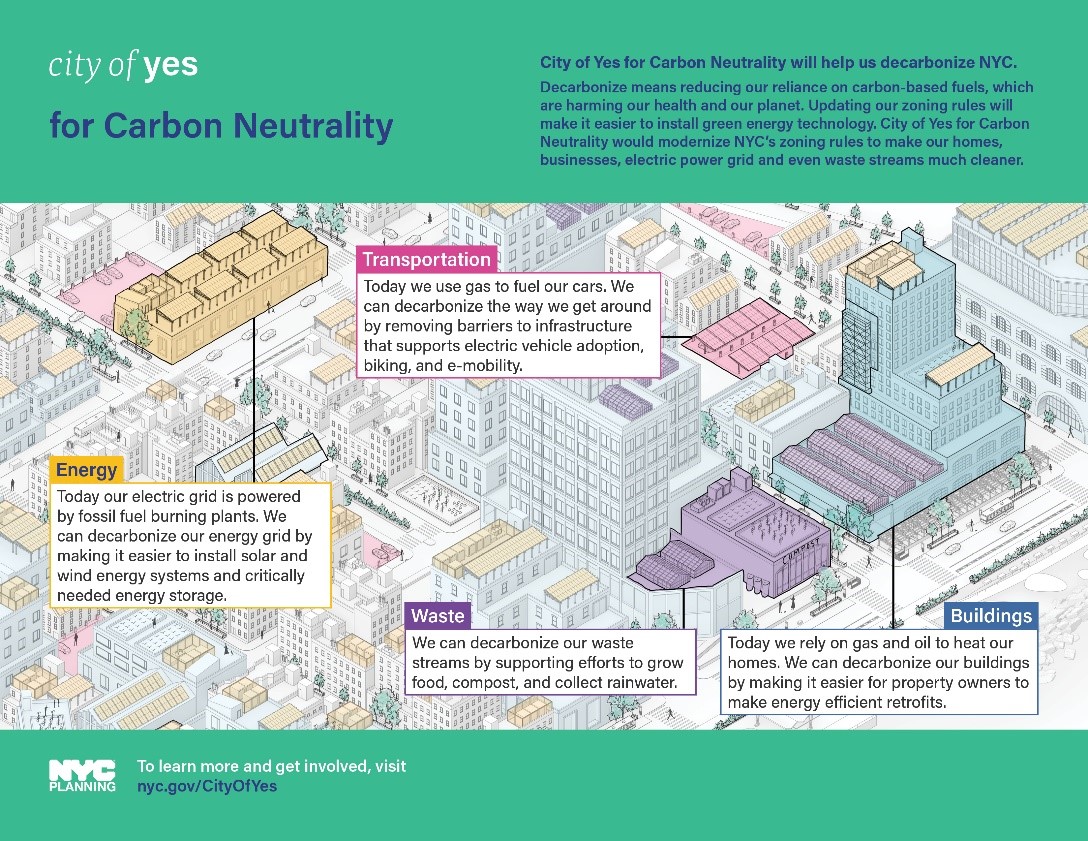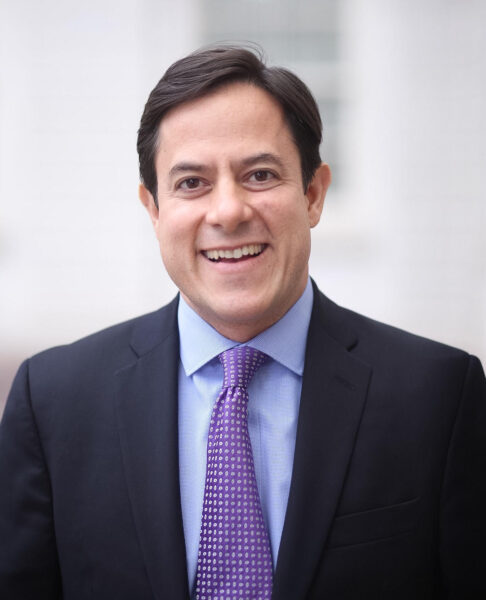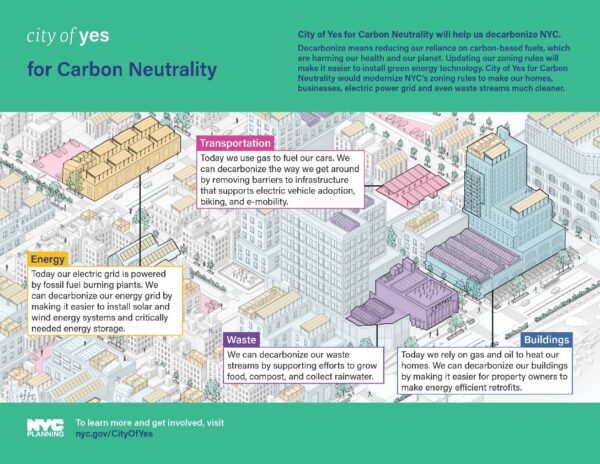
City Planning Commission votes to approve City of Yes for Carbon Neutrality
Proposal will remove barriers to greener approach for construction, transportation and waste water systems
NEXT STEP: CITY COUNSEL APPROVAL

 The Big Apple may soon be greener. Department of City Planning (DCP) Director and City Planning Commission (CPC) Chair Dan Garodnick this week celebrated the City Planning Commission’s vote in favor of City of Yes for Carbon Neutrality, a set of 17 citywide zoning changes that would modernize the city’s Zoning Resolution to facilitate climate action, clean energy, and resiliency by removing barriers to greener energy, buildings, transportation, and water and waste systems. This initiative is the first of Mayor Eric Adams’ three “City of Yes” zoning proposals to create a more sustainable, prosperous, and equitable New York to pass the Planning Commission.
The Big Apple may soon be greener. Department of City Planning (DCP) Director and City Planning Commission (CPC) Chair Dan Garodnick this week celebrated the City Planning Commission’s vote in favor of City of Yes for Carbon Neutrality, a set of 17 citywide zoning changes that would modernize the city’s Zoning Resolution to facilitate climate action, clean energy, and resiliency by removing barriers to greener energy, buildings, transportation, and water and waste systems. This initiative is the first of Mayor Eric Adams’ three “City of Yes” zoning proposals to create a more sustainable, prosperous, and equitable New York to pass the Planning Commission.
“In the midst of a climate emergency, the City Planning Commission’s vote represents a bold step towards tackling our city’s carbon emissions. City of Yes for Carbon Neutrality will create a more energy-efficient city, one where the sun powers our homes, where cars on our roads are low- or zero-emission, where our air is cleaner, and where composting puts our garbage to work rather than in a landfill,” said Dan Garodnick, Chair of the City Planning Commission and Director of the Department of City Planning. “Thanks to the City Planning Commissioners for their support of this important, necessary proposal that will set us on the path to a greener, healthier New York.”

“The overwhelming affirmative vote for City of Yes for Carbon Neutrality will help the City advance some of its most important climate policies: achieving Local Law 97 mobilization; helping low-income communities build wealth with community solar; creating more green infrastructure to mitigate the impacts of flooding; and creating thousands of local jobs and training opportunities in building decarbonization, solar, clean energy, and more,” said Victoria Cerullo, Acting Executive Director, Mayor’s Office of Climate & Environmental Justice. “It also allows us to check off one of our ambitious 72 PlaNYC initiatives, demonstrating that the Adams Administration is truly getting sustainability done.”
“As a global leader in business and culture, New York City has the power to inspire change and pave the way for a cleaner, brighter future. By taking bold and decisive action to reduce our carbon footprint, we can protect our communities, preserve our natural resources, and build a more sustainable world for generations to come,” said Council Member James F. Gennaro, Chair of the New York City Council’s Committee on Environmental Protection, Resiliency & Waterfronts. “I am thrilled the City Planning Commission has voted to approve City of Yes for Carbon Neutrality, and would like to thank Mayor Adams, as well as the Dept. of City Planning, for their steadfast commitment to green energy.”
“The City Planning Commission’s approval of the City of Yes for Carbon Neutrality is a major step forward in meeting our climate and resiliency goals. It is essential that we modernize outdated zoning and think creatively about how we can use our built environment to create a greener, more sustainable city. I look forward to supporting its ultimate passage by the City Council,” said City Council Majority Leader Keith Powers.
“New York City must use every tool at our disposal to address the climate crisis, and the City of Yes for Carbon Neutrality initiative is an important update to ensure that our city’s zoning is furthering our sustainability efforts. I commend the City Planning Commission for advancing these changes and look forward to discussing them with my City Council colleagues,” said City Council Member Gale Brewer.
City of Yes for Carbon Neutrality will update outdated regulations that currently create roadblocks for New Yorkers to retrofit their homes for energy efficiency or resiliency, install heat pumps or solar panels, switch to electric vehicles, or compost and recycle — all critical steps for New York City to reach its ambitious environmental goals. Its 17 policy proposals include:
Facilitate a Renewable Energy Grid – This initiative would remove existing zoning obstacles that severely limit how much space on a rooftop can be covered by solar panels, unnecessarily slowing the city’s shift towards renewable energy sources. It would also make it easier to install energy storage infrastructure needed for solar energy and facilitate standalone, grid-supporting solar and community microgrids — particularly in low-income communities — that are currently banned in residential areas.
These changes would open up over 8,500 acres of parking lots across the city for potential use of solar panels. If fully built out, these solar panels could power more than 130,000 homes.
Create Cleaner Buildings – This initiative would lighten onerous restrictions on the height and thickness of walls that restrict building electrification and retrofits for greater efficiency. It would add flexibility, making these modifications possible while maintaining the look and feel of the city’s neighborhoods.
These changes would facilitate environmentally friendly retrofits for over 50,000 buildings, including more than 1 million homes where retrofits are currently infeasible and restricted by city zoning.
Support Electric Vehicles and Micromobility – This initiative would more than double the commercially zoned land where electric vehicle charging facilities can be located. It would also clarify regulations and facilitate safe bicycle and e-mobility parking. These changes would make electric vehicle charging possible in more than 400 million additional square feet.
Modernize Water, Compost, and Recycling Regulations – This initiative would expand the use of permeable paving and rain gardens, cut red tape and eliminate uncertainty for recycling and composting, and encourage rooftop food production.
These changes would help divert the 34 percent of New York City’s residential waste — and as much as 45 percent of all solid waste — that is organic material from landfills to beneficial use.
In the lead-up to the Commission’s favorable vote, City of Yes for Carbon Neutrality received positive recommendations from 25 Community Boards, as well as from the Bronx, Brooklyn, Manhattan, and Queens Borough Presidents, and the Bronx and Manhattan Borough Boards. It will now go to the New York City Council for a public hearing and final vote this fall.
“I applaud the New York City Planning Commission for their visionary vote on ‘City of Yes for Carbon Neutrality.’ This bold initiative will expedite the development of distributed generation, such as solar and energy storage by providing clear installation requirements and specifying permitted locations for battery storage. Together, we are lighting the path towards a cleaner, more efficient, and carbon-neutral city. Let’s harness the power of innovation and collaboration to create a brighter tomorrow for all New Yorkers,” said Gregory Elcock, Vice President, Customer Clean Energy Program, Con Edison.
“Effective zoning reform requires both setting sound goals and getting the details right,” said Sarah Watson, Deputy Director at Citizens Housing and Planning Council. “The City of Yes for Carbon Neutrality text amendment does both – promising a major leap forward in bringing solar power, energy efficiency, and green infrastructure to New York City’s buildings and neighborhoods. We appreciate the City’s collaboration with sustainability professionals to identify green standards that can be maintained as technology and practices rapidly evolve.”
“The City of Yes for Carbon Neutrality zoning amendment is a pivotal step in our fight against climate change and we applaud the City Planning Commission for voting in favor of this measure. Simplifying the process for implementing green technologies and retrofitting buildings to allow for clean energy solutions is a necessary step for reducing emissions, improving air quality, and aligning with New York City’s ambitious climate goals, and we strongly urge the City Council to endorse this measure later in the year,” said Alia Soomro, Deputy Director of New York City Policy for the New York League of Conservation Voters.
“If New York is going to do its part to tackle climate change, then it needs to make it possible to retrofit aging buildings for the modern world, and the City of Yes for Carbon Neutrality zoning text amendment will go a long way toward making that vision a reality,” said Jolie Milstein, President and CEO of the New York State Association for Affordable Housing. “We are especially encouraged by tweaks that will allow elevated solar panels to cover 100 percent of a roof, enable building retrofits using exterior insulating panels, and encourage building electrification by allowing HVAC equipment in appropriate locations. NYSAFAH looks forward to working with the City to get this done and applauds the administration for its efforts.”

“NYSERDA is pleased to see the City of Yes for Carbon Neutrality amendments to citywide zoning adopted. This initiative will not only accelerate the transition to a carbon neutral future by expanding access to solar, energy storage, building efficiency upgrades and electric vehicle charging stations — but will also help create a healthier and more sustainable City and State for all,” said New York State Research and Development Authority’s Vice President of Clean Resilient Buildings Susanne DesRoches.
“These innovative City of Yes for Carbon Neutrality initiatives are absolutely essential to facilitate timely response to the rapidly changing demands that climate change has placed on the city, its residents, and businesses,” said Kathryn Wylde, President & CEO, Partnership for New York City.
“Common sense makes common sense. The City of Yes proposals have the power to substantially increase the availability of community solar in New York City,” said Stephen Levin, CEO of Solar One, New York’s leading environmental education nonprofit. “Community Solar is a key strategy to expand access to solar to renters, low-income families, and others who cannot install solar on their own rooftops. It requires large rooftops or large open spaces so that multiple customers can subscribe to receive credits on their electricity bills for solar energy generated. It’s been slow to develop in New York City, partially due to space constraints. The proposed rules passed today allow for new spaces to be used for community solar, helping our electricity grid and helping New Yorkers save on sky-rocketing electricity bills. We applaud this vote.”
“This is a clear win for climate change to modernize zoning codes that accelerate building decarbonization,” said John Mandyck, CEO, Urban Green Council. “Urban Green was proud to partner with Chair Garodnick and DCP to identify common sense zoning changes that will usher carbon emission reductions for NYC. City of Yes for Carbon Neutrality is ensuring that decarbonization is doable at a time we need it most.”
“We applaud the City Planning Commission for approving Mayor Adams’ City of Yes for Carbon Neutrality proposal,” said Peggy Shepard, Co-Founder and Executive Director of WE ACT for Environmental Justice. “It will help address decades of environmental racism by removing barriers that would otherwise delay the decarbonization of our buildings. The carbon emissions produced by buildings – which account for nearly 70 percent of the city’s overall emissions – create a public health threat that disproportionately impacts communities of color and low-income.”
City of Yes for Carbon Neutrality is the first of three “City of Yes” initiatives to update New York’s zoning for a more inclusive and equitable city. The other two proposals are:
- City of Yes for Economic Opportunity, which would support New York’s economic recovery by allowing more types of businesses to locate in more places, support growing industries, and foster vibrant neighborhoods. The Department of City Planning has held two public info sessions on City of Yes for Economic Opportunity and will formally refer it for public review this fall.
- City of Yes for Housing Opportunity, an inclusive, citywide approach to our City’s housing crisis that would expand and diversify the housing supply, and ensure that every neighborhood contributes to New York City’s growth and provide equitable access to housing for all New Yorkers. It will enter public review in early 2024.
Department of City Planning
The Department of City Planning (DCP) plans for the strategic growth and development of the City through ground-up planning with communities, the development of land use policies and zoning regulations applicable citywide, and its contribution to the preparation of the City’s 10-year Capital Strategy. DCP promotes housing production and affordability, fosters economic development and coordinated investments in infrastructure and services, and supports resilient, sustainable communities across the five boroughs for a more equitable New York City.
In addition, DCP supports the City Planning Commission in its annual review of approximately 450 land use applications for a variety of discretionary approvals. The Department also assists both government agencies and the public by advising on strategic and capital planning and providing policy analysis, technical assistance and data relating to housing, transportation, community facilities, demography, zoning, urban design, waterfront areas and public open space.
Leave a Comment
Related Articles


Earth Day weekend 2024 celebrated in Brooklyn

Healthy harbor update: Billion Oyster Project hosts informative fundraiser in exclusive Williamsburg setting

Premium Content
The key to a healthy harbor:
Support of Billion Oyster Project,
and their education program, will
restore city’s harbor, vital shoreline
Leave a Comment
The Brooklyn Daily Eagle and brooklyneagle.com cover Brooklyn 24/7 online and five days a week in print with the motto, “All Brooklyn All the Time.” With a history dating back to 1841, the Eagle is New York City’s only daily devoted exclusively to Brooklyn.
© 2024 Everything Brooklyn Media
https://brooklyneagle.com/articles/2023/09/14/city-planning-commission-votes-to-approve-city-of-yes-for-carbon-neutrality/

